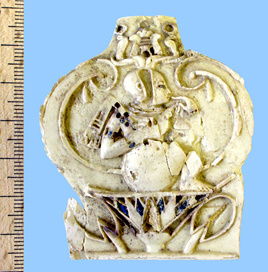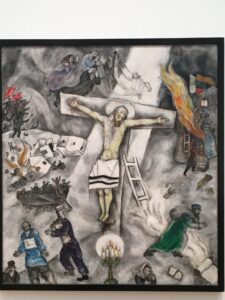 King Omri (876-869 BCE) was a major player in the history of ancient Palestine. He forged an alliance with the Phoenician king Ethbaal of Tyre, sealing the deal by the marriage of his son Ahab to Ethbaal’s daughter Jezebel, bringing the wealth of the Phoenician sea trade into his kingdom.
King Omri (876-869 BCE) was a major player in the history of ancient Palestine. He forged an alliance with the Phoenician king Ethbaal of Tyre, sealing the deal by the marriage of his son Ahab to Ethbaal’s daughter Jezebel, bringing the wealth of the Phoenician sea trade into his kingdom.

Dissatisfied with his backwater capital at Tirzah, Omri built the city of Samaria, which archaeological investigation reveals to have been both beautiful and well-fortified. Indeed, in many passages, “Samaria” becomes a way of referring to the northern kingdom, as “Judah” is used for the southern. The Samarian ivories, over 12,000 finely carved decorative items, confirm both the wealth of Omri’s kingdom, and the beauty of his capital: a showplace of the ancient world.
Outside of the Hebrew Bible, Omri is mentioned on the Moabite Mesha Stele (ca. 84o BCE), which calls the kingdom of Israel “the house of Omri.” The image at the head of this blog is from the Black Obelisk of Shalmaneser III (859-824 BCE), depicting King Jehu of Israel (843-815 BCE) doing obeisance before the Assyrian monarch; he is identified in the inscription as Jehu of bit-Homri: “the house of Omri.” Indeed, for generations after Omri’s death, Assyrian texts continued to refer to the northern kingdom of Israel as mat bit-Homri; the land of the house of Omri.
Yet, in the history of Israel in Samuel-Kings, Omri gets only six verses:
In the thirty-first year of Judah’s King Asa, Omri became king of Israel. He ruled for twelve years, six of which were in Tirzah. He bought the hill of Samaria from Shemer for two kikkars of silver. He fortified the hill and named the town that he built there after Shemer, the previous owner of the hill of Samaria. Omri did evil in the Lord’s eyes, more evil than anyone who preceded him. He walked in all the ways and sins of Jeroboam, Nebat’s son, because he caused Israel to sin. They angered Israel’s God, the Lord, with their worthless idols. The rest of Omri’s deeds and his powerful acts, aren’t they written in the official records of Israel’s kings? Omri lay down with his ancestors and was buried in Samaria. His son Ahab succeeded him as king (1 Kings 16:23-28).
What does this tell us? Clearly, Samuel-Kings is not an objective history of ancient Palestine—but then, it never pretends to be. This is a confessional statement, an affirmation of the meaning of Israel’s history in terms of the covenant theology found in Deuteronomy. By those standards, Omri, who lived and ruled in violation of that covenant, was just another wrong turn on Israel’s journey. Ultimately, he doesn’t matter.
It is all too easy for us, confident in our self-importance, to see ourselves as the main characters in the world’s drama: and of course, nothing bad can happen to the main characters. Thinking ourselves invulnerable, invincible, we misunderstand the world and our place in it.
Twenty-three years ago today, our sense of national invulnerability was shattered in a single morning, as three airplanes, loaded with passengers and fuel, were directed by sad, wicked, deluded men into the World Trade Center towers and the Pentagon. Another plane, intended to crash into either the Capitol or the White House, was forced down near Shanksville, Pennsylvania by its heroic passengers and crew – saving the lives of others at the cost of their own.
 In the wake of this attack, our national confidence was shaken; our naivete was lost. But unfortunately, it was all too easy for us to learn the wrong lessons. At the time, in a sermon I preached at Woodlake UMC, where I was serving as an interim pastor, and at a public gathering in the Ashland, VA town square, I said
In the wake of this attack, our national confidence was shaken; our naivete was lost. But unfortunately, it was all too easy for us to learn the wrong lessons. At the time, in a sermon I preached at Woodlake UMC, where I was serving as an interim pastor, and at a public gathering in the Ashland, VA town square, I said
Sisters and brothers, God forbid that the horrific assault that our nation suffered on Tuesday should cause us to forget who we are! We are a nation founded upon fundamental human rights and freedom for all people, affirming the essential dignity of every woman and man. If this assault makes us forget that, then the terrorists will have won. They will have destroyed, not just stone and mortar and steel and flesh, but the dream that makes us who we are. . . . Friends, the people who committed this atrocity may have been Arabs, but the Arab people did not do this. Those who brought this horror to us may have called themselves Muslims, but Islam did not do this. In the difficult days ahead, should the call that justice be brought to the criminals who perpetrated this act transform itself into a cry of vengeance against a race or religion, we must recognize that prejudice for the evil that it is, repudiate it, and root it out of our midst.
Sadly, our national response did not avoid violence and racism–either abroad or at home. Our ill-considered “War on Terror,” involving the shameful torture of prisoners, culminated in a withdrawal from Afghanistan reminiscent of the last days of the Vietnam War, leaving the Taliban in control. Indeed, apart from the execution of the chief 9/11 planner Osama bin Laden, it is difficult to see much at all that was accomplished, wasting the international outpouring of good will responding to that initial terrorist assault.
At home, the attacks “triggered a wave of hate crimes against individuals and institutions perceived to be Arab or Muslim.” Indeed, one major political party has apparently gone all in on anti-immigrant hatred and xenophobia. Mr. Trump and his running mate JD Vance have repeated on the national stage an unfounded and ludicrous slur against Haitian immigrants in Springfield, OH: “In Springfield, they’re eating the dogs. The people that came in, they’re eating the cats. They’re eating — they’re eating the pets of the people that live there.” Local officials in Springfield have found no evidence, either credible reports or specific claims, of pets being harmed by Haitian residents. But when fact-checked at the presidential debate, Mr. Trump’s response was that it must be true because he had seen it on television!
Friends, if we think that we can somehow get back our naive sense of confidence and invulnerability by attacking outsiders, or by abandoning our democracy, sacrificing our freedoms so that we can make ourselves safe once more, we have learned the wrong lesson. On the other hand, if we think that nothing we do matters, if we succumb to fear and despair, then again we have learned the wrong lesson.
Perhaps the real lesson of 9/11 is also the lesson of Omri. History is neither in the hands of the Omris nor the Osamas. The future is shaped, neither by leaders great in the world’s eyes, nor by nihilists bent on the world’s destruction.
History is in the hands of our God, who sees history differently than we do: after all, by the standards of Christian Scripture, the greatest event in human history was the execution of an accused insurrectionist by Roman soldiers on a hill outside Jerusalem. Whatever may come, we may confidently entrust our future into the hands of the God who raised Jesus from the dead. As the apostle Paul boldly confessed,
Who will separate us from Christ’s love? Will we be separated by trouble, or distress, or harassment, or famine, or nakedness, or danger, or sword? As it is written, “We are being put to death all day long for your sake. We are treated like sheep for slaughter” [Psalm 44:22].
But in all these things we win a sweeping victory through the one who loved us. I’m convinced that nothing can separate us from God’s love in Christ Jesus our Lord: not death or life, not angels or rulers, not present things or future things, not powers or height or depth, or any other thing that is created (Romans 8:35-39).
Rejecting both hatred and despair, friends, let us resolve to live in hope.
AFTERWORD:
The painting of Christ on the cross above is Jewish artist Marc Chagal’s “White Crucifixion.” Facsimiles of the Mesha Stele and (I believe) the Black Obelisk are part of the collection in Pittsburgh Theological Seminary’s Kelso Museum of Near Eastern Archaeology (temporarily closed for public tours).

